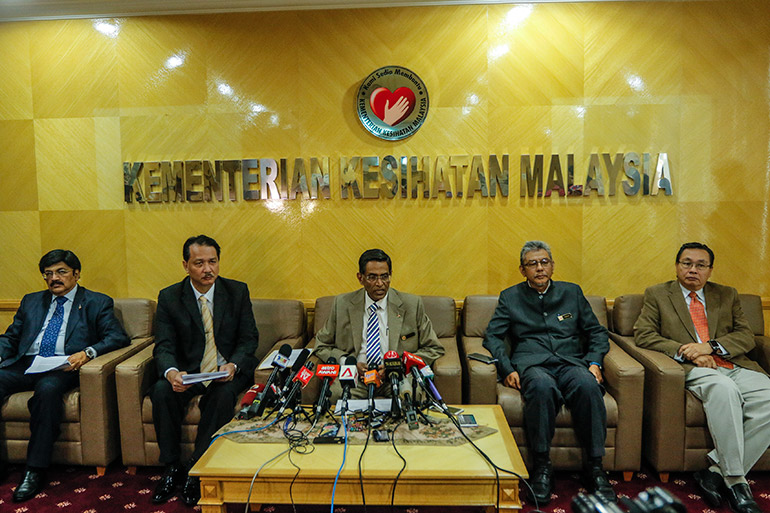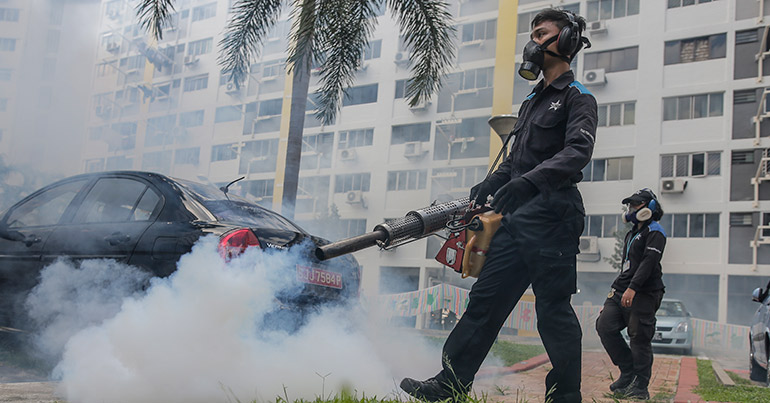With Singapore’s infection rates reaching triple figures, Malaysians visiting the city-state are at risk of being exposed to the Zika virus

The first case of the Zika virus in Malaysia has been confirmed less than a day after the number of cases in Singapore reached triple figures.
A 58-year-old Malaysian woman tested positive to the virus after visiting Singapore in late August. The Southeast Asian travel hub has become the latest beachhead for the spread of Zika through Southeast Asia, with Thailand, Vietnam and Hong Kong also reporting dozens of confirmed infections.
Malaysia’s health minister S. Subramaniam revealed in a press conference today that the government was responding to the development by intensifying its campaign to eradicate the yellow fever mosquito, or aedes aegypti, responsible for spreading the virus. More than 200,000 Malaysians are estimated to commute to and from Singapore every day.
Subramaniam told the media that local resistance from people living near potentially infested areas was hampering the government’s ability to fight the spread of Zika.
“We request that people who live in those areas allow our vector control officers to enter their houses to spray and fog within their houses,” he said using the technical term for the eradication of carrier animals. “Very often we are not very successful in that because people do not allow our officers to enter into their houses – and a lot of breeding sites are within the houses themselves.”
The news comes less than 24 hours after the Singapore government revealed that the city-state had its first pregnant woman to test positive for the virus.
The Zika virus, which presents few to no symptoms in those it infects, has been linked to severe brain defects and microcephaly in children born to women infected with the virus. The US-based Centre for Disease Control and Prevention has recommended that pregnant women abstain from travelling to areas where Zika has been detected.
Singapore minister for health Gan Kim Yong said in a joint statement between the Ministry of Health and the National Environment Agency that this was only the beginning of the Zika outbreak in the city-state.
“Over time, we expect Zika cases to emerge from more areas,” he stated. “We must work and plan on the basis that there is Zika transmission in other parts of Singapore and extend our vector control efforts beyond the current affected areas.”
Regional World Health Organisation (WHO) spokesperson Eloi Yao told Southeast Asia Globe that while Singapore was so far doing a good job fighting the spread of Zika, the virus would likely spread to other countries within Southeast Asia.
“WHO anticipates that Zika virus will continue to spread and can reach many countries and territories where aedes aegypti mosquitoes are found,” he said.
Yao said that even the most medically well-equipped countries had been unable to halt the spread of the Zika virus, adding that some 67 countries around the world had reported evidence of mosquito-borne Zika virus transmission since 2015.
“Singapore has experience of fighting dengue, and much of the response is similar – vector control, informing the population and the like,” he said. “One difference between dengue and Zika is that Zika can be sexually transmitted, so it is important for people to be made aware of this and how to protect themselves.”
Singapore minister for the environment and water resources Masagos Zulkifli stressed that vector control remained the best defence against the proliferation of Zika, pleading with local residents not to resist the government’s efforts to purge the affected zones.
“I urge all residents in affected areas to cooperate fully with NEA officers and allow them to inspect homes so that we can spot and destroy mosquito breeding as soon as possible, and to spray insecticide to kill any mosquitoes,” he said.
Singapore’s Zika virus outbreak spreads to Malaysia
With Singapore's infection rates reaching triple figures, Malaysians visiting the city-state are at risk of being exposed to the Zika virus


